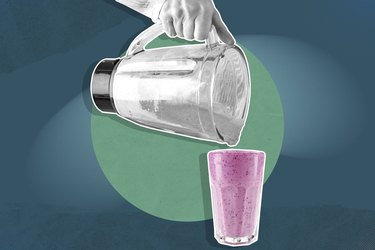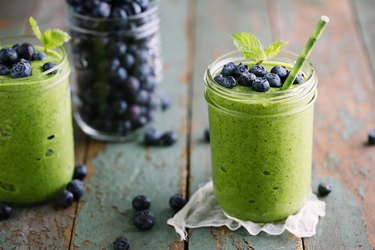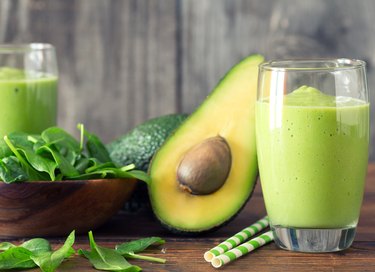
If you've ever been told that you shouldn't drink your calories, consider smoothies an exception to this rule.
It's estimated that only 12 percent of adults in the U.S. are eating enough fruit each day, and that number drops to 10 percent for vegetables, according to the Centers for Disease Control and Prevention (CDC).
Video of the Day
Video of the Day
Each day, the goal is to have 1.5–2 cups of fruit, and 2–3 cups of vegetables, per the CDC. Smoothies are an excellent way to meet these daily recommendations — and yes, you can put vegetables in your smoothies (think spinach, celery, baked sweet potatoes and cucumbers).
Is It Healthy to Drink Smoothies Every Day?
With all the fruit and vegetables, it's easy to assume that all smoothies are nutritious — but that's not always the case. If you're going to enjoy a smoothie every day, make sure to follow these tips:
- Steer clear of added sugars: Nix the honey, agave, maple syrup or chocolate hazelnut spread when making a smoothie. Let the sweetness come from fresh and frozen fruit.
- Go easy on the juice: It can be tempting to add sweet juices to thin out your smoothie, but this also adds a lot of concentrated calories and sugar. Opt for milk, unsweetened plant-based milk, coconut water or plain filtered water to thin out your smoothie.
- Mind your portions: Commercial smoothie bars make smoothies that are large and full of calories and sugar. Stick with 8 to 12 ounces of your favorite smoothie if you are going to drink one every day.
Here's what really happens to your body when you drink a smoothie every day, and how it fits in your diet for long-term health.
You May Lose Weight
Eating more fruit and vegetables has been shown to contribute significantly to weight loss, according to a July 2020 review in Nutrients.
Other research has shown that people eating a plant-based diet with lots of fruits and veggies eat fewer calories and lose more weight than people following a low-carb (keto) diet, per the results in a small study in the January 2021 issue of Nature Medicine.
There are a few reasons why eating more fruits and veggies could help if you're trying to lose weight and keep it off: Water and fiber. Produce is rich in both of these, which help fill you up and keep you full, according to a July 2018 review in the journal Nutrients.
Fruits and vegetables are also low in calories, which means you can typically eat more without racking up calories.
Your Skin Could Clear Up
Your skin is constantly exposed to a myriad of harmful environmental stressors including chemicals, ultraviolet rays and pollution. All of these factors can accelerate signs of aging, but components in fresh fruits and vegetables may help protect and regenerate skin cells.
Carotenoids are one of the compounds in many yellow, orange and green leafy vegetables that can help protect the skin and improve texture and appearance, according to August 2019 research in Antioxidants.
It's not just carotenoids that are getting the love for helping the skin — other foods that have been shown to have skin-protecting benefits are soy, apples, pomegranate juice, peanuts, and turmeric, according to a January 2021 review in Nutrients.
This gives you a wide range of options for smoothies that includes more than just a fruit smoothie, but one that includes nuts or spices. The wide range of antioxidants in plant foods — vitamin C, vitamin A and flavonoids — are largely responsible for their skin health benefits.
Your Gut Health May Improve
Smoothies are a delicious way to get your daily fiber. Since most Americans are not meeting the daily fruit and vegetable recommendation, the same holds true for fiber. Most Americans take in less fiber each day than the recommended amount, per Harvard Health Publishing. You should aim to get 14 grams of fiber per every 1,000 calories you eat, according to the Academy of Nutrition and Dietetics.
Fiber is an essential part of your gut health. Having an unhealthy microbiome — aka the community of bacteria that live in your gut — can contribute to a wide range of digestive and chronic conditions, according to the Harvard T.H. Chan School of Public Health. Eating more fiber can help improve the health of your gut.
Drinking a smoothie is different from juicing because the pulp and fiber are maintained, so if you are able to keep the skins on your fruits or vegetables, do it — the skins of apples, peaches, and English cucumbers blend up well. You'll also benefit from the fiber contained within the fruit, which you often don't get with juicing.
Your daily smoothie may also help keep you regular with all the extra fiber and added hydration.
It Could Support Your Immunity
Nutrition is a major line of defense in strengthening your immune system.
Eating fruits and vegetables may lower overall inflammation in the body and have a protective effect on the immune system, according to a June 2018 review in the American Journal of Clinical Nutrition.
Short-term inflammation in the body is okay, but long-term inflammation caused by poor diet, lack of exercise and stress can eventually lead to chronic disease.
In addition to fruits and vegetables, adding probiotic foods (like yogurt and kefir) or prebiotic foods (such as bananas or oats) to your smoothie can help keep your gut healthy and your immune system strong.
Your Brain Health May Improve
Common smoothie ingredients like green leafy veggies and berries are high in antioxidants, which may help keep your brain sharp. The flavonoids in plant foods may help protect the brain and may improve cognitive function, according to a May 2021 review in Antioxidants.
Some of the foods mentioned in the review to consider adding to your daily smoothie are tart cherries, apples, walnuts, all berries, oranges, pomegranates, cocoa and spinach.
The Bottom Line
Smoothies can either be a nutritious addition to your diet or they can destroy your efforts. Skip the sugar-heavy smoothies and opt instead for one that is full of whole foods with no added sweeteners.
Not sure where to start? You can follow this handy smoothie formula for a balanced blend, and get creative with all types of plant foods in your smoothies and vary your ingredients — it could improve your health in more ways than one.
- Dietary Guidelines for Americans
- Nutrients: "A Comprehensive Critical Assessment of Increased Fruit and Vegetable Intake on Weight Loss in Women"
- Antioxidants: "Do We Utilize Our Knowledge of the Skin Protective Effects of Carotenoids Enough?"
- Nutrients: "Bioactive Compounds for Skin Health: A Review"
- American Journal of Clinical Nutrition: "Effects of Fruit and Vegetable Consumption on Inflammatory Biomarkers and Immune Cell Populations: A Systematic Literature Review and Meta-Analysis"
- Nature Medicine: "Effect of a Plant-Based, Low-Fat Diet Versus an Animal-Based, Ketogenic Diet on Ad Libitum Energy Intake"
- Academy of Nutrition and Dietetics: "Fiber"
- Antioxidants: "Plant Foods Rich in Antioxidants and Human Cognition: A Systematic Review"
- Harvard TH Chan School of Public Health: Fiber
- Nutrients: "Dietary Fibre as a Unifying Remedy for the Whole Spectrum of Obesity-Associated Cardiovascular Risk"
- Harvard Health Publishing: "Should I be eating more fiber?"



